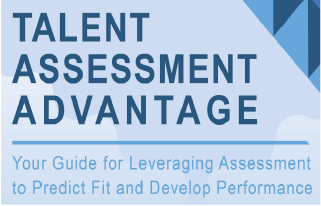Megan, who is a candidate for the open VP of Operations role, had completed her initial recruiter interview and the next round of interviews with the hiring manager and other stakeholders on the team.
The feedback was that she was excellent in presentation, knowledge, and experience: articulate, smart, knowledgeable of the industry, and seemed to know all of the critical aspects of the Operations role.
When you added it all up, everything looks like she would be a great new hire.
That is until her assessment results came back and showed that she scored low on critical thinking, and her personality scores showed that she had several potential “red flags.”
In this situation, what does a hiring manager do?
Do they lean more on the assessment data that says that the candidate is not a good fit, or does the manager follow the advice from the interview panel who say that Megan would be a great hire?
At CMP, we have been providing assessment solutions to organizations, supporting informed and predictive selection. As our President Joe Frodsham says, we support data-based executive selection decisions every day of the week.
There is not a clear cut answer.
A validated assessment program consisting of role-aligned tools will provide benchmarked and reliable data where you can evaluate a candidate across a range of core competencies that are critical to success in the role. While the methodology is scientific, it is not perfect. Some candidates may not assess thoroughly: they may not understand the questions or are taking the test during a time when they are stressed, sick, tired, distracted, or going through a traumatic event. Any of these factors can negatively impact the candidate’s scores.
Basing hiring decisions solely on interviewing may not be the best, most predictive path. Candidates who interview well may mask holes in their skill set or background. People, especially in unstructured interviews, may have their judgment influenced by personal bias, poor listening, or inadequate questioning. This option is not perfect, either.
So back to the challenge that I presented: Megan interviewed great and looked like a good hire, but her assessment data shows several red flags. What do you do?
At CMP, we have two assessment SME’s (subject matter experts) Joe Frodsham, our President, and Scott McTague, our Senior VP of Talent Fit Solutions. Together they have developed and delivered over 10,000 assessments to help clients hire and develop top talent.
What would Joe and Scott recommend in a situation like this (BTW – they have been faced with this question hundreds of times)?
Have an aligned and rigorous approach. To ensure your selection processes and tools yield consistently predictive results, they (behavioral/cognitive assessments and targeted interviews) need a foundation of alignment with the company vision, culture, and role-based competencies and in-depth coverage of the key skills and behaviors indicative of successful performance. A simple mapping process will produce the necessary alignment and rigor.
Dig more in-depth on the reference checks that the candidate has provided. Ask questions about the target areas or competencies that the assessment brought into question. For example, if there are questions around emotional intelligence, ask the reference of how the candidate behaved in a stressful situation (the more specific the case – the better).
Explore talking with off-the-sheet reference checks. Another option is to speak with some of the candidate’s former co-workers who are not on the candidate’s list of references. Ask the same probing questions about the concerns that have been identified in the assessment.
Conduct a follow-up interview. It may make sense to have the candidate return so that you can ask them follow-up questions directly.
Trust your instincts. This advice may sound like counter-intuitive advice after running a candidate through an assessment process, but you will, in the end, have to trust your judgment and make the best decision based on all of the information at hand. Some red flags that the assessment identifies can be managed with coaching, mentoring, and carefully managing the onboarding process. Some other assessment red flags (low critical thinking scores – for example) may be an indicator that the candidate will struggle in their new role.
Bottom line, assessments built by sound science are powerful tools that can provide high predictability for a successful hire. That said, we cannot merely hire based on assessment data alone – this is valuable information based on the evaluation of talent across many like roles but only a part of the overall predictive hiring equation.
This is why interviewing will still play an essential role in the hiring process. Eventually, you will face a situation like the example I provided where the candidate’s interview performance does not match their assessment rating for job fit.
With some due diligence, follow-ups with reference, co-workers, and follow-up interviews, you will be on your way to make an informed and well thought out hiring decision.





